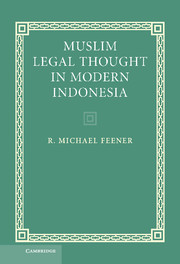Book contents
- Frontmatter
- Contents
- Acknowledgments
- A note on transliteration
- List of abbreviations
- Preface: Toward an intellectual history of modern Indonesian Islam
- 1 Technology, training, and cultural transformation
- 2 The open gate of ijtihād
- 3 An “Indonesian madhhab”
- 4 Sharī ʿa Islam in a Pancasila nation
- 5 New Muslim intellectuals and the “re-actualization” of Islam
- 6 The new ‘ulamā’
- 7 Next generation fiqh?
- Conclusion
- Bibliography
- Index
3 - An “Indonesian madhhab”
Published online by Cambridge University Press: 29 September 2009
- Frontmatter
- Contents
- Acknowledgments
- A note on transliteration
- List of abbreviations
- Preface: Toward an intellectual history of modern Indonesian Islam
- 1 Technology, training, and cultural transformation
- 2 The open gate of ijtihād
- 3 An “Indonesian madhhab”
- 4 Sharī ʿa Islam in a Pancasila nation
- 5 New Muslim intellectuals and the “re-actualization” of Islam
- 6 The new ‘ulamā’
- 7 Next generation fiqh?
- Conclusion
- Bibliography
- Index
Summary
Frequently in one part of the world, that is held for the law of nations, which is not so in another. Now this law of nations is proved in the same manner as the unwritten civil law, and that is by the continual experience and testimony of the Sages of the Law.
Hugo Grotius, De Jure Belli ac PacisOver the first few decades following the achievement of national independence in 1945 the fledgling nation of Indonesia faced new struggles as it sought to define itself. During this time, conflicts between the Nationalists, Socialists, Communists, and Islamists were most pronounced in debates over the constitutional basis for the state and the model of law promulgated by it. It was in this context that some Indonesian thinkers began a movement that was unprecedented in the history of Islamic law: the creation of a new “national” madhhab for the Muslim inhabitants of the Republic. These developments were significantly affected by the drastic changes in the politics and social order of the newly independent country, while at the same time deeply rooted in the legal models of the former colonial state. Under the Dutch, the institutional role of Islamic law in many Muslim areas of their East Indies territories was progressively subsumed within a system of legal administration characterized by a complex congeries of courts ruling according to the Dutch colonial code and various local systems of customary law (adatrecht).
- Type
- Chapter
- Information
- Muslim Legal Thought in Modern Indonesia , pp. 54 - 80Publisher: Cambridge University PressPrint publication year: 2007



